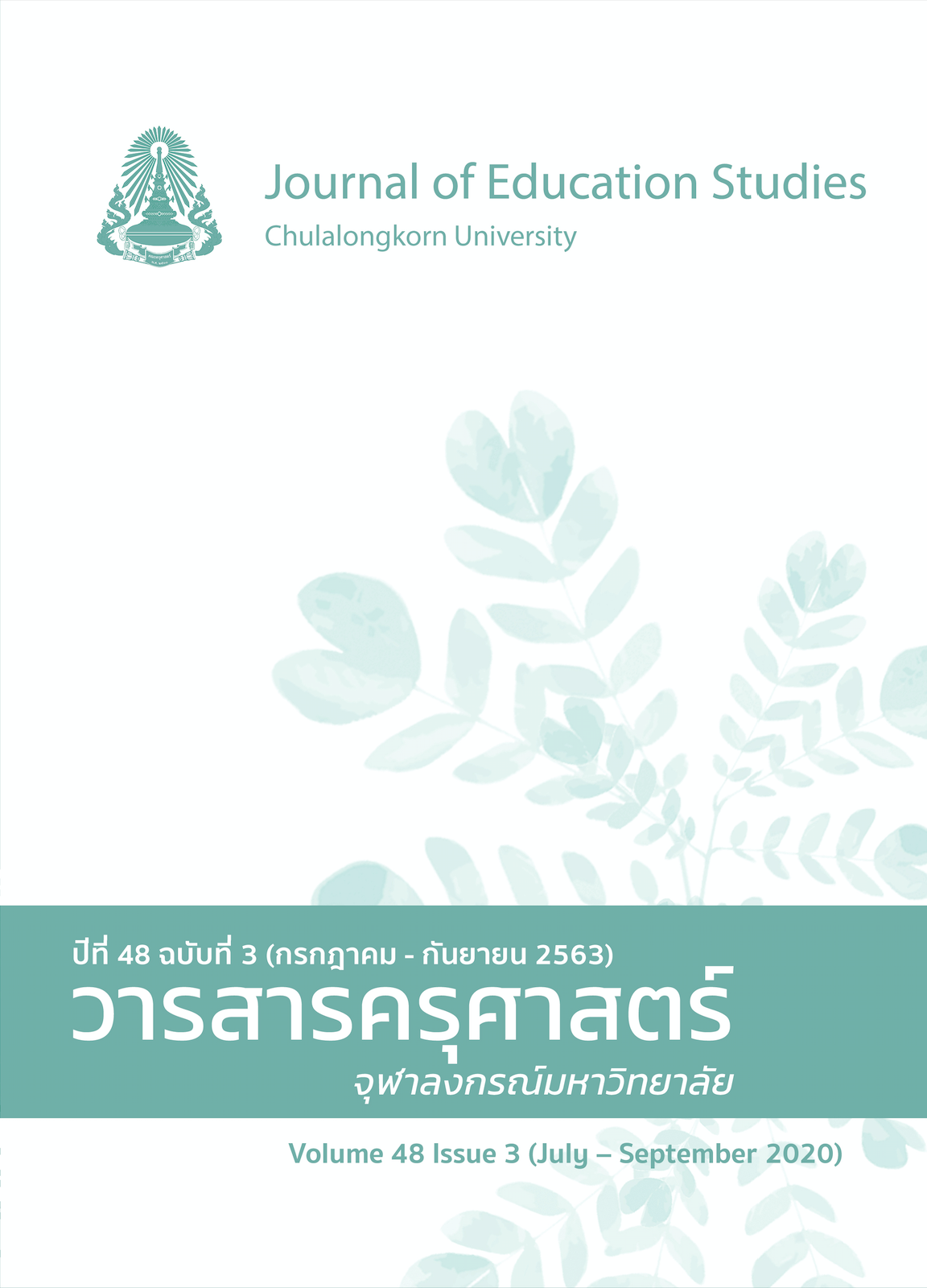Development of a Conceptual Framework for an Analysis of Guardian’s Parenting Styles in Hmong Hill Tribe Group
DOI:
https://doi.org/10.14456/educu.2020.40Keywords:
conceptual framework, parenting styles, guardian, Hmong hill tribe groupAbstract
The purpose of this research was to develop a conceptual framework of guardian parenting styles among a Hmong Hill Tribe group. The research methodology utilised in the present study included studying research papers related to parenting, format for raising lifestyle, culture, and parenting styles. The factors that were found to affect the parenting of the Hmong Hill Tribe Group. Data schemas were then developed to define elements for raising children in the context of parenting among Hmong Hill tribes. The conceptual framework findings can be categorised into four elements, including: 1) Authoritative type in which children are free by the maturity and development of children; 2) Authoritarian type in which children must follow strict rules; 3) Permissive type in which children do things according to their needs without rules being defined; and 4) Neglecting type in which there are omissions or where children’s needs are not met and very little attention is paid to them. Furthermore, a conceptual framework tool was developed to analyse the parent styles of the Hmong Hill Tribe group to raise children.
References
งามพิศ สัตย์สงวน. (2538). หลักมานุษยวิทยาวัฒนธรรม. ธรรมสภา.
จริญญา โคตรชนะ. (2552). ผลของการให้กลุ่มสนับสนุนทางสังคมต่อศักยภาพการอบรมเลี้ยงดูเด็กวัยก่อนเรียน และความเครียดของย่ายายในอำเภอภูเวียง จ.เลย [วิทยานิพนธ์ปริญญามหาบัณฑิต ไม่ได้ตีพิมพ์]. มหาวิทยาลัยขอนแก่น.
ชูพินิจ เกษมณี. (2531). คู่มือการทำงานชาวเขาเผ่าแม้ว. กรมการศึกษานอกโรงเรียน: โครงการศูนย์การศึกษาเพื่อชุมชนในเขตภูเขา ศูนย์การศึกษานอกโรงเรียนภาคเหนือลำปาง.
ณิชาวีร์ กุลพรพิพัฒน์. (2547). วิจัยองค์ความรู้แม่และเด็กชนเผ่าม้ง. ภัทรศิลป์เชียงใหม่.
บัญจางค์ สุขเจริญ, วีรัตน์ ใกล้บุปผา, อัจฉรา เปรื่องเวทย์, พัฒนา ปลื้มถนอม, ศิริรัตน์ พิชิตชัยชาญ, และ ทิฆัมพร มัจฉาชีพ. (2544). ความรู้และการปฏิบัติของมารดาในการส่งเสริมพัฒนาการเด็ก. วารสารการพยาบาลกุมารเวชศาสตร์, 1(1), 100-113.
พรรณทิพย์ ศิริวรรณบุศย์, ธีระพร อุวรรณโณ, เพ็ญพิไล ฤทธาคณานนท์, สุภาพรรณ โคตรจรัส, คัคนางค์ มณีศรี, และ พรรณระพี สุทธิวรรณ. (2545). การศึกษารูปแบบความสัมพันธ์ระหว่างพฤติกรรมของคนไทยกับกระบวนการทางสังคมประกิตของครอบครัวในปัจจุบันที่เอื้อต่อการพัฒนาประเทศ. คณะจิตวิทยา จุฬาลงกรณ์มหาวิทยาลัย. http://cuir.car.chula.ac.th/handle/123456789/12565
ยัง ม็อตแต็ง. (2520). ประวัติของชาวม้ง (แม้ว). โอเดียนสโตร์.
วราภรณ์ รักวิจัย. (2540). การอบรมเลี้ยงดูเด็กปฐมวัย (พิมพ์ครั้งที่ 2). แสงศิลป์การพิมพ์.
สำนักงานคณะกรรมการวัฒนธรรมแห่งชาติ. (2546). ชาติพันธ์และมายาคติ. องค์การรับสินค้าและพัสดุภัณฑ์.
สำนักนโยบายและยุทธศาสตร์. (2557). รายงานผลตามเป้าหมายการพัฒนาแห่งสหัสวรรษด้านสุขภาพ ฉบับที่ 3 พ.ศ. 2557. สามเจริญพานิชย์.
สำนักงานเลขาธิการสภาการศึกษา. (2556). บทบาทของพ่อแม่ ครูพี่เลี้ยง และผู้ดูแลเด็กในการเลี้ยงดูและพัฒนาเด็กปฐมวัย. สำนักงานเลขาธิการสภาการศึกษา. http://backoffice.onec.go.th/uploads/Book/1232-file.pdf
สุภาพรรณ โคตรจรัส และ ชุมพร ยงกิตติกุล. (2545). ความสัมพันธ์ระหว่างรูปแบบการอบรมเลี้ยงดูพฤติกรรมส่วนบุคคลของวัยรุ่นไทย. ใน การประชุมสัมมนา ครั้งที่ 2 เรื่อง วิกฤตความเครียดของสังคมไทย [Symposium]. การประชุมสัมมนาศูนย์วิจัยวิทยาศาสตร์จิตวิทยาตะวันออก-ตะวันตก ครั้งที่ 2, กรุงเทพมหานคร.
สุมน อมรวิวัฒน์ และคณะ. (2534). การอบรมเลี้ยงดูเด็กตามวิถีชีวิตไทย. สำนักพิมพ์แห่งจุฬาลงกรณ์มหาวิทยาลัย.
อุดมชัย องคสิงห์. (2539). ชาวเขาเผ่าม้งกับความมั่นคงแห่งชาติ. วิทยาลัยป้องกันราชอาณาจักร.
ภาษาอังกฤษ
Barney, G. G., & Strauss, A. L. (1967). The discovery grounded theory: Strategies for qualitative research. AldineTransaction.
Baumrind, D. (1971). Harmonious parents and their preschool children. Developmental Psychology, 4(1), 99-102.
Baumrind, D. (1991). Parenting styles and adolescent development. In J. Brooks-Gunn, R. M. Lerner, & A. C. Petersen (Eds.), The encyclopedia on adolescence (pp. 746-758). Garland Publishing.
Boyes, J., & Piraban, S. (1990). Hmong voices. Trasvin.
Lor, S. (1999). Parental influences and academic success of Hmong adolescent students: Is there a relationship [Unpublished master’s thesis]. University of Wisconsin-Stout.
Maccoby, E. E., & Martin, J. A. (1983). Socialization in the context of the family: Parent-child interaction. In E. M. Hetherington (Ed.), Handbook of child psychology: formerly Carmichael's manual of child psychology (Vol.4). Wiley.
Moua, T. (2003). The Hmong culture: Kinship, marriage & family systems [Unpublished master’s thesis]. University of Wisconsin-Stout.
Tapp, N. (1989). Sovereignty and rebellion: The white Hmong of northern Thailand. Oxford University Press.
Vang, T. K. (1998). Hmong parents attitude and perception toward Hmong juvenile delinquency in America [Unpublished master’s thesis]. University of Wisconsin-Stout.
Downloads
Published
How to Cite
Issue
Section
License

This work is licensed under a Creative Commons Attribution-NonCommercial-NoDerivatives 4.0 International License.




